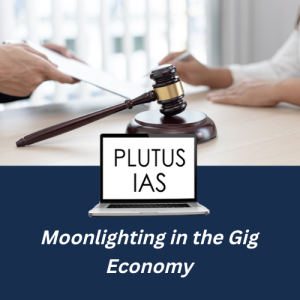07 Oct Moonlighting in the gig economy
The Topic is based on Moonlighting in the gig economy
WHAT IS MOONLIGHTING
Moonlighting is the act where employees work for remuneration with companies other than their employers. It is mostly associated with the gig economy where the flexibility of work permits people to take up a second job. The term is not defined in any law even though some legislations deal with double employment.
In July, a study by Kotak Securities stated that at least 60% of 400 employees surveyed said they had or knew someone who had engaged in moonlighting.
A few months ago, Swiggy, a food delivery company launched this Policy permitting its employees to work on projects outside of their employment.
LEGAL PROVISIONS
- Since moonlighting is a relatively newer phenomenon that gained prominence after the onset of Covid pandemic, no Constitutional court has given any judgment so far on it.
- Though some legislation touches upon it, no law covers it comprehensively.
- Section 60 of the Factories Act, for example, deploys restriction on double employment stating that “No adult worker shall be required or allowed to work in any factory on any day on which he has already been working in any other factory, save in such circumstances as may be prescribed” However, this deals only with factories and not other employments
- In the case of Glaxo Laboratories India Ltd. v. Presiding Officer Labour Court Meerut, the Supreme Court held that “the employer has hardly any extraterritorial jurisdiction. He is not the custodian of general law and order situation nor the Guru or mentor of his workmen for their well-regulated cultural advancement. If the power to regulate the behavior of the workmen outside the duty hours and at any place wherever they may be was conferred upon the employer, contract of service may be reduced to the contract of slavery”
- Hence, by the above case, it is clear that the terms of employment are not extendable beyond the working hours of the employee or outside the place of employment. Therefore, technically employees cannot be stopped from pursuing other job avenues after their shift or office hours are over.
- Unless and until this act of having a second job leads to serious loss of the primary employer, Courts may refuse to entertain such cases.

Pic: Moonlighting in the gig economy
ARGUMENTS FOR MOONLIGHTING
- Extra income for employees: It allows employees to earn extra money. The high cost of living in urban areas and metropolitan cities often requires undertaking more than one job to financially sustain oneself and or her family.
- Developing new skills: It lets employees gain new skills which are different from their current employment.
- Managing inflation levels: With prices soaring high, people find it difficult to afford necessities leading to taking up more jobs.
- Job Security: With the gig economy, hiring and firing is done in the blink of an eye. This has been more so during COVID Pandemic when companies undertook mass lay off. Having additional employment gives people some sense of security that even if they are fired from one job they have another job to fall back upon.
- Productively utilizing extra time: With the new work-from-home norm, people have extra time at hand since time for commutation is saved. Employees use this to take up side gigs.
ARGUMENTS AGAINST the ACT
- May lead to Conflict of interest: Employees may end up working for rival firms and leak sensitive business information. Wipro recently sacked 300 employees following the discovery that they were working for rival firms on the side, leading to a conflict of interest.
- May lead to a decline in productivity: Since the physical capacity of people is limited, working at two places can drain a person and job performance may deteriorate.
- Misuse of resources: To complete gigs, the employee may be using the resources like the internet and laptop provided by the primary employer.
- Unethical: Though it may not be illegal, it is unethical and some companies have simply called it cheating
WAY AHEAD
In India, there is no clear-cut legislation regarding the Act that can be applied to every field of employment. So the idea of it being legal or illegal for now widely depends on the employers and their terms of appointment. The terms of employment may be modified to include the provision that it should not cause any conflict of interest or reduction in productivity
It is imperative that the Government brings a policy or law to deal with the subject and give some clarifications since moonlighting is inevitable in a gig economy.
SOURCES
Daily Current Affairs for UPSC
Current Affairs are very important to get the latest news from the national and international world. Without reading daily current affairs, No one increases their general knowledge. If you would like to familiarize yourself with the news of the national and international world, you should read daily current affairs for your UPSC examination. So reading current affairs is very crucial for any competitive examination. If you are IAS, UPSC, or SSC aspirant, you should read daily updated current affairs. PlutusIAS provides the best current affairs for the UPSC examination free of cost. If you are preparing for UPSC, IAS exams, you will get new current affairs daily.



No Comments